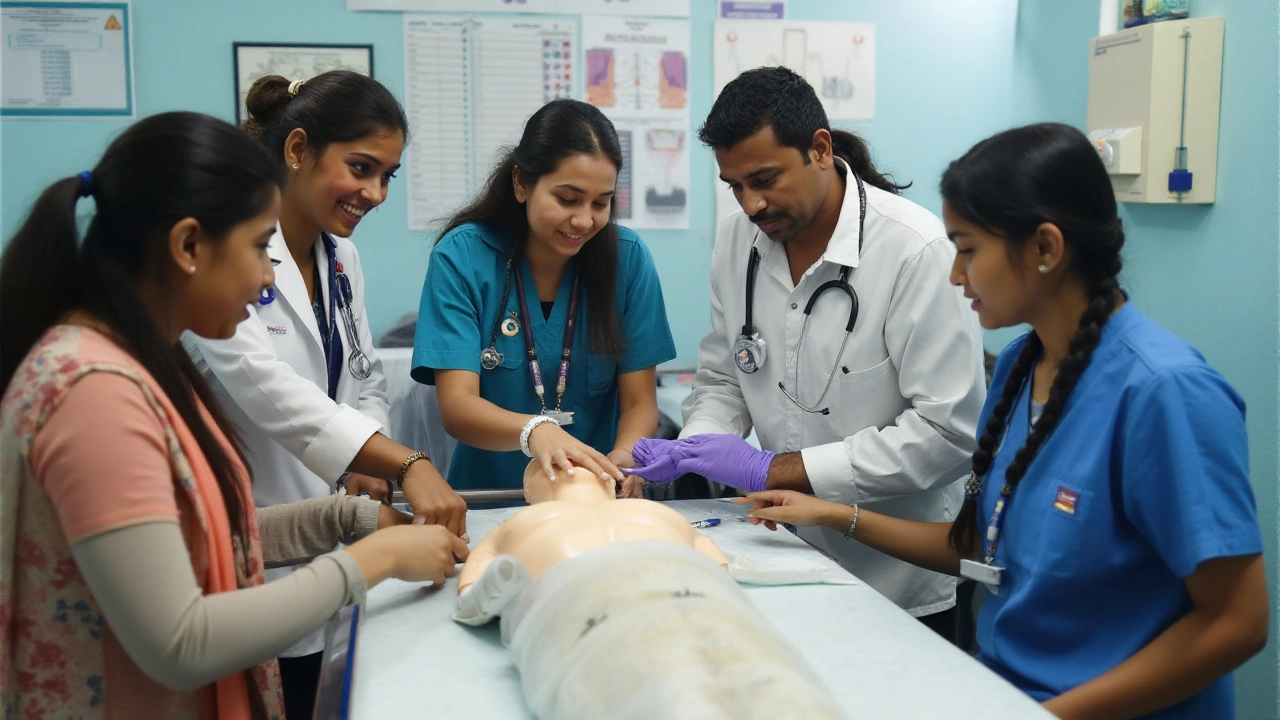
In India, diploma courses have emerged as a popular choice for students and working professionals alike, looking to enhance their skill set and gain a competitive edge in the job market. These courses provide a unique blend of practical knowledge and theoretical grounding, allowing individuals to specialize in a niche area within a short period.
From technology and engineering to design and healthcare, the options for diploma courses are as diverse as the interests they cater to. They are an excellent option for those who may not want to commit to a full degree program but still want to gain solid expertise and credentials in their chosen field.
Understanding which diploma course aligns with your career aspirations and current market trends is crucial for making an informed decision. Whether you're looking to kickstart a new career path or boost your current one, a well-chosen diploma course can serve as a crucial stepping stone toward achieving your professional goals.
- Understanding Diploma Courses
- Popular Fields for Diploma Studies
- Benefits of Diploma Education
- Top Institutions Offering Diploma Courses
- Tips for Choosing the Right Diploma Course
- Future Scope and Career Opportunities
Understanding Diploma Courses
In the arena of education, diploma courses stand out as a unique medium offering targeted learning and career advancement opportunities. Unlike traditional degree programs, these courses are designed with a primary focus on practical skills and industry relevance. They often range from one to two years in duration, making them a flexible choice for individuals eager to enhance their qualifications rapidly. The tailored curriculum of a diploma course enables students to dive straight into their field of interest, honing specialized skills required in the professional world.
India, being a hub of educational diversity, provides a plethora of diploma programs that cater to the varied interests and aspirations of learners. Whether you are inclined towards engineering, healthcare, business, or the creative arts, there is likely a suitable diploma course waiting to be explored. Diploma courses typically emphasize hands-on learning experiences, often supplemented by internships or project work, which is crucial for developing real-world expertise. For instance, a diploma in software engineering may involve substantial coding practice, equipping students with the abilities necessary for a future in the tech industry.
According to the National Skill Development Corporation of India, "Diploma courses have been instrumental in bridging the skill gap in various sectors, thus playing a vital role in boosting employment rates among youth."
Another intriguing facet of diploma courses is their adaptability with evolving market demands. These courses are frequently updated to incorporate the latest trends and technologies, ensuring that graduates remain competitive in their respective fields. It’s not uncommon for individuals already in the workforce to opt for a diploma course as a means to upskill or pivot to a new career trajectory. This constant evolution makes diplomacy education a smart investment for both fresh students and seasoned professionals looking for growth and adaptability in today’s fast-paced job markets.
While discussing education in India, it's important to highlight the role of diploma courses in promoting inclusivity. Many institutions offer affordability and accessibility as key features of these programs, often providing scholarships or financial aid options for deserving candidates. Hence, diploma courses have the potential to democratize education, offering nearly limitless opportunities for learners from varying socioeconomic backgrounds. With clear pathways to employment and often faster returns on educational investments, diploma courses remain a pivotal choice for many eager for academic and career success.
In essence, understanding the structure and advantages of diploma courses allows individuals to make more informed educational choices. It offers a balance between learning and practical application, aligning with the goals of those who yearn to make a swift impact in their career. The evolving landscape of professional demands only stresses the importance of these courses, as they innovate and adapt to provide the necessary skills and knowledge needed in a dynamic economy.
Popular Fields for Diploma Studies
In recent years, the educational landscape in India has seen a notable shift towards diploma courses, with particular dynamic fields gaining prominence. These fields not only cater to the evolving needs of the job market but also provide students and professionals with opportunities for rapid career advancement. Among these fields, technology stands out as one of the most sought-after areas for diploma studies. Courses in IT and networking often focus on practical skills that are highly valued in today's digital workplaces, helping students bridge the gap between academic knowledge and industry requirements.
Another popular domain for diploma courses is management. With the business world evolving at a fast pace, many individuals opt for diploma courses in business administration, project management, or human resources to gain specific managerial skills that a traditional degree may not cover in-depth. These specialized courses are usually shorter than conventional degrees, allowing aspirants to quickly move into roles that require a nuanced understanding of business dynamics. Interestingly, a diploma in management is often preferred by professionals looking to pivot their career in a new direction or aiming for leadership roles in their existing field.
Healthcare is yet another field where diploma courses are making significant strides. Courses such as diploma in nursing, pharmacy, or medical lab technology provide both theoretical knowledge and hands-on practice, essential for thriving in the medical profession. The demand for skilled healthcare professionals has been on a steady rise, especially in light of recent global events, making these diplomas an attractive choice. Notably, healthcare diplomas often incorporate internship modules that expose students to real-world settings even before they graduate.
Design and animation also claim their spot among popular diploma studies, drawing creative minds eager to explore fields like graphic design, interior design, or game design. The growing media and entertainment industry in India fuels the demand for professionals with a strong foundation in design principles and digital tools. As companies increasingly seek unique visual content to communicate with their audiences, having a diploma in design can be a significant asset.
According to a report by NASSCOM, "India's animation and VFX industry is poised to grow over 20% annually," indicating the promising potential for those who pursue related diploma courses.Those eager to dive into the realms of creativity and innovation find these courses both enjoyable and rewarding career-wise.
Table 1 below provides a glimpse of some of these popular fields and the types of diploma courses they offer, highlighting the diversity and breadth of opportunities available.
| Field | Popular Diploma Courses |
|---|---|
| Technology | IT, Networking, Software Development |
| Management | Business Administration, Project Management |
| Healthcare | Nursing, Pharmacy, Medical Lab Technology |
| Design | Graphic Design, Interior Design, Animation |

Benefits of Diploma Education
Embarking on a diploma course journey can be transformative, providing numerous advantages for those looking to advance their careers in India. These educational pathways are designed to be concise and comprehensive, offering specialized knowledge in a fraction of the time compared to traditional degree programs. This is particularly beneficial for individuals eager to enter the workforce quickly or those seeking to pivot to a different career path without the time commitment of a full degree program. With the education sector's evolving dynamics, diplomas have proven to be a flexible option, allowing learners to combine practical experience with theoretical frameworks seamlessly.
One of the primary draws of a diploma course is its ability to offer specific, job-ready skills. In industries like technology and healthcare, theoretical proficiency isn't enough; hands-on experience is crucial. Diploma courses frequently incorporate internships or projects, providing students with invaluable real-world exposure. This can significantly boost a graduate's appeal to potential employers who value practical experience and the ability to adapt quickly to industry demands. For instance, a diploma in software engineering might include modules where students develop actual software projects, making them competent in coding practices employed by tech giants.
Enhancing Employability and Career Opportunities
Aside from skill acquisition, diploma education plays a pivotal role in enhancing employability. In a competitive job market, a diploma can distinguish you from other candidates. Employers often regard diploma holders as proactive individuals who possess specialized knowledge without the lengthy educational delay, making them assets to any organization. It's telling that according to a survey by NASSCOM, employers in India's information technology sector have shown a strong preference for candidates with diplomas, emphasizing their readiness for the job from day one."Diplomas offer a faster route to employment, with a more focused approach to learning the skills needed in today's rapidly-changing job market," remarks Dr. Anil D'Souza, an education consultant who actively engages with curriculum development across India's technical colleges.
Additionally, the affordability of diploma programs cannot be understated. Typically, these courses are less expensive than traditional degree courses, making education more accessible to a broader demographic. Many students, especially those from economically challenged backgrounds, find diploma courses to be a smart investment with a high return, potentially leading to jobs with competitive salaries across diverse industries. The focus on core skills without the burden of lengthy academia allows students to avoid financial crippling while still progressing towards their career goals.
Improved Career Flexibility
Let's not overlook the flexibility offered by diploma education. These courses are often available in various formats—full-time, part-time, or online. This flexibility is a boon for working professionals who want to gain additional qualifications without pausing their careers. It allows learners to schedule their studies in such a way that they can maintain a balance between work, family, and education. This has been instrumental in contributing to an increase in lifelong learning, encouraging people from different walks of life to pursue education at any stage of their careers, a trend that's gaining traction globally.
In essence, diploma courses cut across the diversity of education pathways in India, offering pragmatic solutions to contemporary career challenges. They present a myriad of opportunities for personal and professional development, helping individuals to stand out in a sea of potential hires. For anyone contemplating a faster, cost-effective, and skill-intensive educational approach, diploma courses represent a compelling option worth considering.
Top Institutions Offering Diploma Courses
India boasts a rich tapestry of educational institutions that offer a range of diploma courses, catering to varied interests and career goals. These institutions have established a strong reputation for providing quality education that blends practical skills with theoretical insights. When you think about technology and engineering, institutions like the Indian Institute of Technology (IIT) offer highly regarded diplomas. These programs are tailored to equip students with cutting-edge skills prevalent in the industry today. Their curriculum often includes hands-on projects and real-world problem-solving experiences that are pivotal in preparing students for challenges they may face in the tech sector.
For those interested in the healthcare sector, colleges affiliated with reputed universities such as the All India Institute of Medical Sciences (AIIMS) offer specialized diploma courses in nursing and paramedical disciplines. These courses focus on both core theory and practical application, ensuring that students develop a comprehensive understanding of healthcare practices. AIIMS, renowned for its research and medical innovations, emphasizes up-to-date medical knowledge and handling medical technology proficiently. This focus prepares students adequately, enabling them to meet the needs of hospitals and healthcare settings nationwide.
Management and business studies also offer abundant opportunities for diploma specialization. The Indian Institute of Management (IIM) is frequently acknowledged for its excellence in management education. Although primarily known for its degree programs, several IIMs offer short-term diplomas targeting working professionals. These programs often encompass areas such as business strategy, leadership, and digital marketing, catering to both fresh graduates and seasoned professionals aiming for skill enhancement or career transitions. Their curriculum is often interdisciplinary, emphasizing real-world relevance and industry connections.
In the creative domain, institutions like the National Institute of Design (NID) provide diploma courses in design aesthetics, graphic design, and industrial design. NID is known for its progressive approach to design education, which encourages innovation and critical thinking. Students engage in studio-based learning, where innovation is encouraged, fostering an environment of creativity and experimentation. This provides a fundamental foundation for students eyeing a career in creative industries, such as media, advertising, and design firms.
It's noteworthy to mention the inclusion of digital platforms that now play a key role in delivering diploma programs to a broader audience. Platforms like Coursera and Udacity collaborate with these institutions to offer online diploma courses, broadening access to students worldwide. According to a recent survey, nearly 62% of online learners reported employing their newly acquired skills at their workplace within six months of course completion.
"Institutions need to stay ahead by designing courses that not only meet the current demands of employers but also anticipate future skill needs," notes Dr. Ramesh Pokhriyal, a prominent voice in Indian education. This underscores the ongoing evolution in diploma education, where institutions are continuously innovating to align with changing industry needs and student expectations.

Tips for Choosing the Right Diploma Course
Embarking on the journey to select the right diploma course can feel like navigating a labyrinth of opportunities. The decision can be particularly overwhelming given the vast variety of options available in India's educational landscape. The first key to making an informed choice is to conduct thorough research. Begin by understanding the different fields and subfields that align with your career interests and passions. Whether you are drawn to the ever-evolving world of technology or find your calling in creative design, matching your personal interests with your professional goals is crucial. Understanding your own aspirations and how a diploma could help fulfill them is the foundation of a suitable selection.
Another vital factor to consider is the market demand and employment potential associated with the course. Consult industry reports and projections to get a sense of the careers that are in growth phases. For instance, the healthcare sector continues to boom, making diplomas in healthcare management or medical technology highly beneficial. Similarly, IT and digital marketing diplomas offer promising prospects in today's digital world. Balancing personal interests with market trends might seem tricky but is often where the most successful career decisions are made.
"Education is the most powerful weapon which you can use to change the world," remarked Nelson Mandela. And indeed, the power of education lies in its ability to open doors. Thus, engaging in professional mentorship or guidance can also be significantly helpful. Many universities and colleges offer career counseling services that can provide a clearer picture of the potential pathways a diploma can lead to. Discuss your uncertainties and gather insights from academic advisors who have a wealth of experience and advice to offer.
Finally, take into account the duration, cost, and mode of the course. Diploma courses vary considerably; some are full-time and intensive, while others are part-time or offer online options. Balancing these logistics with financial considerations is crucial. Remember that investments in education generally yield long-term benefits, so thinking strategically about funding your diploma could involve looking into scholarships or financial aid. Look for accredited institutions that have a strong reputation in your chosen field, as these are often a testament to quality education and provide better faculty experiences, networking opportunities, and job placement support. In the end, carefully examining these aspects will aid in choosing the right diploma course that not only suits your career aspirations but also aligns with your lifestyle and financial situation.
Future Scope and Career Opportunities
Considering a range of diploma courses available in India, it's evident that the future scope and career opportunities stemming from these qualifications are extensive and diverse. As industries continue to evolve and demand new skills, diplomas can serve as a gateway to career advancement and transition. For instance, diplomas in technology and engineering are in high demand due to the continuous advancement in these fields. Professionals in these areas often find themselves at the forefront of innovation, participating in projects that shape the future of technology and infrastructure in the country.
Healthcare, another burgeoning sector, presents numerous opportunities for diploma holders. With a diploma in healthcare, individuals can enter roles such as medical assistants, lab technicians, or even healthcare administrators. The consistent need for skilled healthcare professionals ensures steady employment prospects and potential for growth. According to a report by NASSCOM, the healthcare industry in India is expected to grow dramatically, driven by technological adoption and increased healthcare access.
Design and creative fields also offer vast possibilities for those equipped with diploma certifications. Whether it's in fashion, graphic design, or animation, such courses provide hands-on training that is appealing to employers. The emphasis on practical skills means graduates are often job-ready, making them competitive candidates in the creative job market. A director at a renowned design institute recently stated,
"Diploma programs specifically in design industries equip students with not only vital skills but also foster creativity and innovation, which are crucial in today's competitive market."
On the management front, business administration and management diplomas are valuable, especially for those aiming to scale up the corporate ladder or manage their own business ventures. These courses often cover essential business practices and strategies, fostering analytical and decision-making skills that are fundamental in any business environment. A trend noted is the increasing interest in specialized management diplomas, like digital marketing, which align well with the digital transformation trends influencing market scopes.
Ultimately, the future scope with education India through diploma courses largely depends on industry demands, technological changes, and economic shifts. Staying attuned to these factors, and aligning your education choices with them, makes you adaptable and equipped to seize forthcoming opportunities. For those uncertain about immediate career paths post-study, exploring internships or entry-level positions can be a strategic move, providing crucial industry experience and helping solidify your career trajectory.

